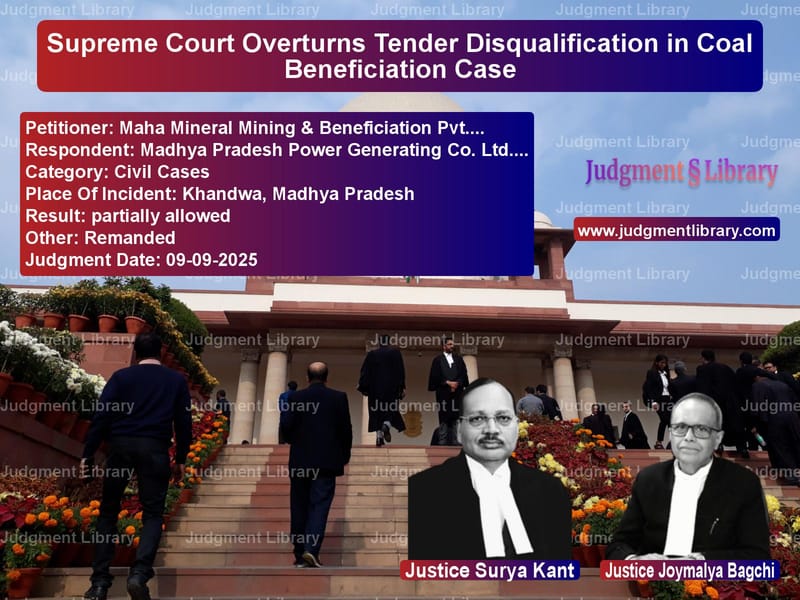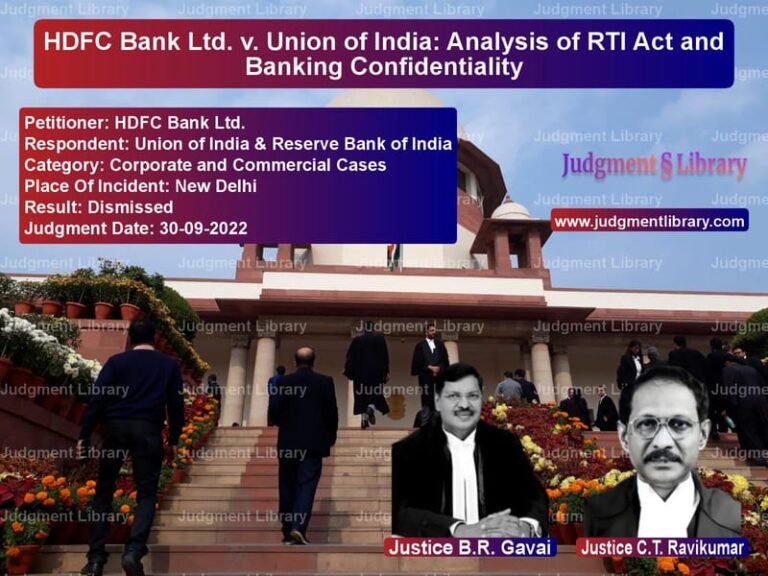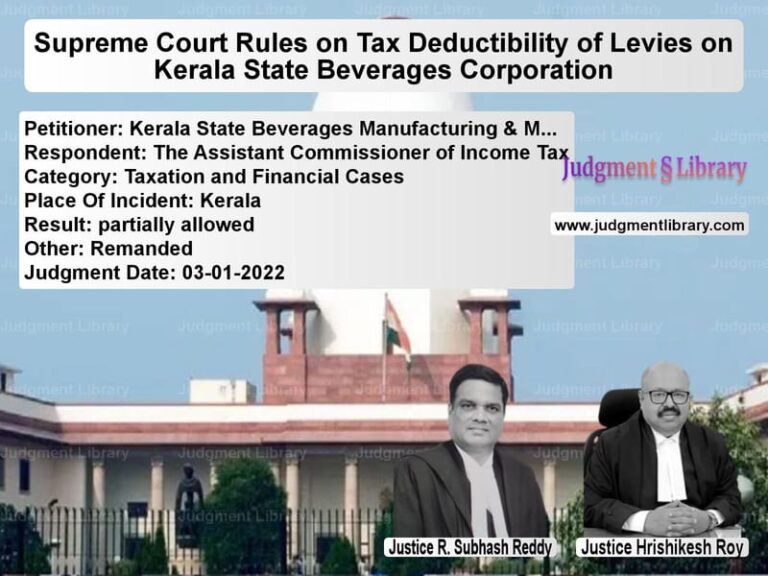Supreme Court Overturns Tender Disqualification in Coal Beneficiation Case
In a significant ruling that clarifies tender evaluation procedures, the Supreme Court has set aside the disqualification of Maha Mineral Mining & Beneficiation Pvt. Ltd. from a coal beneficiation tender process, finding that the tendering authority acted contrary to the terms of the Notice Inviting Tender (NIT). The judgment, delivered on September 9, 2025, addresses crucial questions about tender document interpretation and the limits of disqualification grounds.
The case originated from a tender issued by Madhya Pradesh Power Generating Co. Ltd. (MPPGCL) on May 17, 2024, for run-of-mine coal beneficiation and logistics management from Western Coalfields Ltd. sources for the Shree Singaji Thermal Power Project in Khandwa, Madhya Pradesh. Three companies initially submitted bids, but after one failed to furnish earnest money deposit, only Maha Mineral and Rukhmai Infrastructure Pvt. Ltd. remained in contention.
The controversy began when the Tender Evaluation Committee rejected Maha Mineral’s technical bid on July 4, 2024, citing non-compliance with Clause 5(D) of the NIT concerning past experience criteria. The Committee stated: “As per Clause No. 5(D) ‘Past experience criteria’ of NIT, bidder is allowed to use past experience of their previous Consortium or JV (proportionate to its share in that consortium if defined in the Consortium Agreement, otherwise, lead partner if not defined in the Consortium) to meet out the past experience criteria of the tender. The firm has used the credentials of their consortium M/s Hind-Maha-Mineral LLP for meeting out the past experience criteria. However, Agreement of the Consortium/JV is not submitted to substantiate the share of the bidder in that consortium. Bidder is disqualified due to non-submission of credentials as per Clause No. (5)D of the NIT.”
Read also: https://judgmentlibrary.com/supreme-court-upholds-property-rights-in-land-dispute-case/
Maha Mineral challenged this decision before the Madhya Pradesh High Court, arguing that neither Clause 5(D) nor any other terms of the NIT expressly required a bidder relying on past experience of a previous consortium to produce the Joint Venture agreement itself to demonstrate its proportionate share. The company had submitted a work execution certificate from Maharashtra State Mining Corporation which clearly stated that Maha Mineral was “45% Joint Venture/Consortium Partner of M/s. Hind Maha Mineral LLP vide the JV agreement dated 02.12.2019” and had executed similar work for Western Coalfields Ltd. from March 5, 2021, to March 5, 2024.
The appellant contended that if the first respondent had any doubts about the certificate, they could have verified its correctness from Maharashtra State Mining Corporation or called upon the appellant to furnish the JV agreement. Instead, MPPGCL arbitrarily rejected the technical bid solely because the JV agreement hadn’t been furnished.
MPPGCL countered this argument, maintaining that when any bidder seeks to rely on past experience of a previous consortium or joint venture, submission of the JV agreement was implicit in Clause 5(D) of the NIT. They further relied on Clause 8.1 of the NIT, which stated: “The bidders not submitting all the desired documents as per NIT/Tender Document at the time of submitting bids, shall not be allowed to submit documents subsequently and their bids shall be rejected on account of incomplete documents. Thus, no ‘shortfall window’ for submission of shortfall documents shall be created by MPPGCL in the e-tender.” This clause was further supported by a circular issued by the Government of Madhya Pradesh on November 29, 2023, which explicitly prohibited allowing bidders to submit documents after the bid submission deadline.
During the pendency of the writ petition, Rukhmai Infrastructure was declared the successful bidder and was impleaded in the proceedings. The Madhya Pradesh High Court ultimately upheld the Committee’s decision, noting: “Due to non-filing of Joint Venture agreement by the Petitioner, the Impugned Order rejecting the bid of the petitioner has to be seen wherein at the outset it has been stated that your bid for the above tender has been rejected during Technical evaluation by the duly constituted committee for the reason Bidder is disqualified due to non submission of credentials as per Clause No. (5)D of the NIT.” The High Court went even further, holding that even if the JV agreement had been submitted, the appellant would have been disqualified because its washeries had been exclusively committed to Maharashtra State Mining Corporation under clauses 3.12, 3.13, and 8.5 of the JV agreement.
The Supreme Court, however, took a different view of the matter. The bench comprising Justice Surya Kant and Justice Joymalya Bagchi analyzed Clause 5(D) of the NIT and found that “Clause 5(D) merely states the appellant would be entitled to use the past-experience of a previous consortium/JV in the event its proportionate share is defined in the JV agreement failing which the past-experience shall be attributed to the lead partner. The clause does not mandate the submission of the JV agreement itself to satisfy such criteria.”
The Court emphasized that “Conditions in a NIT must be clear and unambiguous. In the event the tendering authority insisted on furnishing of the JV agreement alone and no other document as proof of the proportionate share of the bidder to avail previous JV experience as prior qualification, it should have been spelt out clearly in the NIT. Having not done so, the 1st respondent cannot thrust the responsibility on the appellant to seek clarification and submit such document.”
The Supreme Court also noted that Clause 8.8 of the NIT, which was couched as a non-obstante clause, reserved the right of the first respondent to seek additional information to satisfy itself regarding the eligibility of any bidder. The Court observed that “1st respondent failed to exercise such discretion by fortifying itself through calling for the JV agreement, which, when placed before this Court, unequivocally endorsed the contents of the certificate submitted by the Appellant.”
Regarding the argument that the appellant had acted with mala fide intention by suppressing the JV agreement, the Court found this unacceptable, stating that “neither Clause 5(D) required submission of JV agreement to prove proportionate share nor was the appellant called upon to submit such document. Moreover, the proportionate share of the appellant in the consortium as reflected in all the documents… is the same and consistent with the work execution certificate submitted in the bid.”
The Supreme Court was particularly critical of the High Court’s decision to disqualify the appellant on additional grounds not considered by the Tender Evaluation Committee. The Court noted that “High Court also lost sight of the fact that the Committee had not adverted to this issue and it was impermissible for it to travel beyond the reasons given by the Committee and disqualify the appellant.” The Court found this to be a contentious issue that should not have been decided without giving the appellant an opportunity to controvert the same.
In its final ruling, the Supreme Court set aside the impugned judgment and order of the High Court and partly allowed the appeal. The matter has been remanded for fresh consideration on whether the appellant had the requisite spare washing capacity as per Clause 5(B) of the NIT, with directions to the High Court to decide the matter expeditiously, preferably within two months from the date of communication of the order.
This judgment reinforces the principle that tender conditions must be interpreted strictly as written, and disqualification cannot be based on requirements not explicitly stated in the tender document. It also underscores the importance of giving bidders proper opportunity to respond to new disqualification grounds raised during litigation. The ruling serves as an important precedent for government tendering processes, ensuring that disqualification decisions are based solely on the explicit terms of the tender document and that bidders are treated fairly throughout the evaluation process.
Petitioner Name: Maha Mineral Mining & Beneficiation Pvt. Ltd..Respondent Name: Madhya Pradesh Power Generating Co. Ltd. & Anr..Judgment By: Justice Surya Kant, Justice Joymalya Bagchi.Place Of Incident: Khandwa, Madhya Pradesh.Judgment Date: 09-09-2025.Result: partially allowed.
Don’t miss out on the full details! Download the complete judgment in PDF format below and gain valuable insights instantly!
Download Judgment: maha-mineral-mining-vs-madhya-pradesh-power-supreme-court-of-india-judgment-dated-09-09-2025.pdf
Directly Download Judgment: Directly download this Judgment
See all petitions in Contract Disputes
See all petitions in Judgment by Surya Kant
See all petitions in Judgment by Joymalya Bagchi
See all petitions in partially allowed
See all petitions in Remanded
See all petitions in supreme court of India judgments September 2025
See all petitions in 2025 judgments
See all posts in Civil Cases Category
See all allowed petitions in Civil Cases Category
See all Dismissed petitions in Civil Cases Category
See all partially allowed petitions in Civil Cases Category







